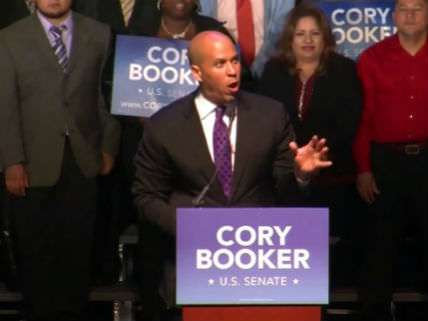Senate Considers Amendments Aimed at Protecting Medical Marijuana Patients From the Feds

After he was elected to replace the late Frank Lautenberg last fall, Sen. Cory Booker (D-N.J.) said he looked forward to working with Sen. Rand Paul (R-Ky.) on drug policy reform. In one of their first collaborations, the two senators this week introduced an amendment aimed at stopping federal interference with state laws allowing medical use of marijuana. The amendment, which the Senate could vote on today, uses the same language as a measure approved by the House of Representatives last month:
None of the funds made available in this Act to the Department of Justice may be used, with respect to the States of Alabama, Alaska, Arizona, California, Colorado, Connecticut, Delaware, District of Columbia, Florida, Hawaii, Illinois, Iowa, Kentucky, Maine, Maryland, Massachusetts, Michigan, Minnesota, Mississippi, Missouri, Montana, Nevada, New Hampshire, New Jersey, New Mexico, Oregon, Rhode Island, South Carolina, Tennessee, Utah, Vermont, Washington, and Wisconsin, to prevent such States from implementing their own State laws that authorize the use, distribution, possession, or cultivation of medical marijuana.
Before the House vote, Rep. Sam Farr (D-Calif.), the amendment's chief co-sponsor, explained its aim this way:
This is essentially saying, look, if you are following state law, you are a legal resident doing your business under state law, the feds just can't come in and bust you and bust the doctors and bust the patient. It is more than half the states. So you don't have to have any opinion about the value of marijuana. This doesn't change any laws. This doesn't affect one law, just lists the states that have already legalized it only for medical purposes, only medical purposes, and says, "Federal government, in those states, in those places, you can't bust people."
If the Senate joins the House in approving the amendment, it would be a powerful statement in favor of marijuana federalism. Still, it's not exactly clear how much protection the spending restriction would give medical marijuana growers and suppliers, since any given raid, prosecution, or forfeiture does not necessarily prevent a state from implementing its law. The feds can always say they are simply enforcing the Controlled Substances Act and portray any impact on the goals of state law as incidental.
The Senate will also consider an amendment introduced by Sen. John Walsh (D-Mont.), that aims to protect the Second Amendment rights of medical marijuana users. Walsh's measure would instruct the Bureau of Alcohol, Tobacco, Firearms, and Explosives not to pursue gun charges against people simply because they use marijuana as a medicine in compliance with state law. But the legislation does not change the Gun Control Act of 1968, so such patients still would be committing a felony simply by owning a gun. It also does not address the weapon charges that gun-owning patients face if the Justice Department prosecutes them for growing marijuana. The penalties for possessing guns while engaged in drug production or trafficking are draconian: a five-year mandatory minimum sentence for the first offense, then 25 years for each subsequent offense, with the sentences to be served consecutively.


Show Comments (4)